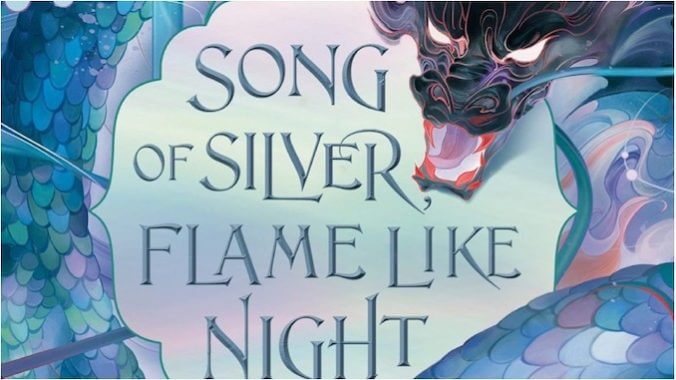Song of Silver, Flame Like Night Introduces An Immersive and Lyrical Fantasy Landscape

The odds are fairly decent that a lot of readers slept on author Amelie Wen Zhao’s debut Blood Heir trilogy—the first book in the series was delayed following a storm of pre-release criticism and vitriolic Twitter feuding, the second by the early days of the coronavirus pandemic, and the whole thing was sort of eventually overshadowed by a much larger (and necessary) industry debate about representation in teen fiction and the supposed perils of cancel culture. But here’s hoping we don’t make the same mistake with her follow-up, Song of Silver, Flame Like NIght, an immersive doorstopper of a fantasy opener that spins a dense, intriguing story of rebellion, hope, and self-discovery. (With a ridiculously exciting cliffhanger.)
Influenced by Chinese mythology, folklore, and xianxia writing, this story clearly has deep roots in Zhao’s own experiences and history, and it’s clear from its first pages—as well as in the author’s note that accompanies it—that this is a tale near and dear to her heart. Her obvious care for every aspect of the tale is evident throughout, from its layered, multidimensional characters to the rich world they inhabit. Since this book clocks in somewhere around 500 pages, you could argue that there are points where the author may well be a little too in love with the world she’s built, but on the whole, the end result is rich, immersive, and realized down to its smallest details.
Song of Silver, Flame Like Night follows the story of Lián’ér, a member of the Hin people of the Last Kingdom, who was just six years old when the Elantians invaded her country, killed her mother, outlawed her people’s magic, and forced the members of her countrymen who survived to live like second-class citizens in service to their conquerors as their land was pillaged for its valuable resources. (Elantian magic is metal-based, meaning the Hin are barely allowed to own real silverware.) Now known as Lan, she entertains patrons as a song girl in Haak’gong’s Rose Pavilion Teahouse, one of the only establishments that still preserves Hin culture. But she spends her days secretly searching the city for clues about the strange Hin character her mother burned into her arm just before she was killed.
When an incident at the teahouse results in a dead Elantian general, Lan is rescued by a mysterious stranger named Zen, one of the last surviving Hin magic practitioners, whose arts have long been forbidden by the conquerors. When he realizes she has abilities of her own and something powerful locked within the mark on her arm, he takes her to the last hidden school of practitioning in China in the hopes of helping her unlock the truth of who she is—and who her mother was. Zen, of course, has his own dark and tangled past that must be reckoned with, and as he and Lan grow closer, their choices become more complicated (and are often more in conflict.)
-

-

-

-

-

-

-

-

-

-

-

-

-

-

-

-

-

-

-

-

-

-

-

-

-

-

-

-

-

-

-

-

-

-

-

-

-

-

-

-








































